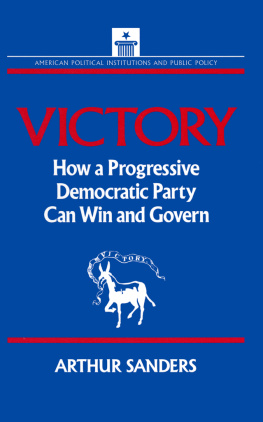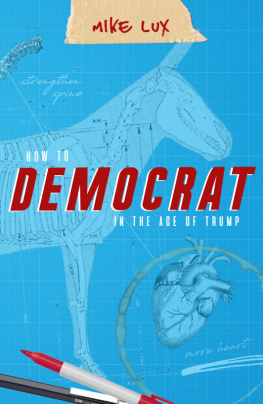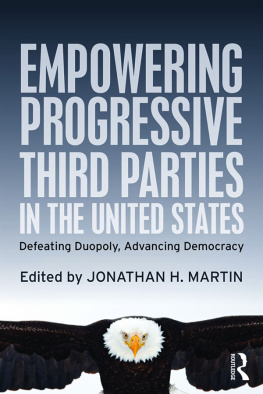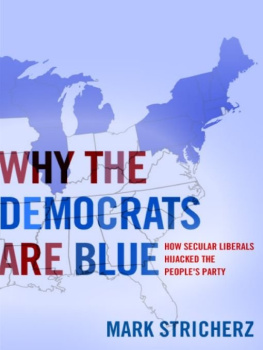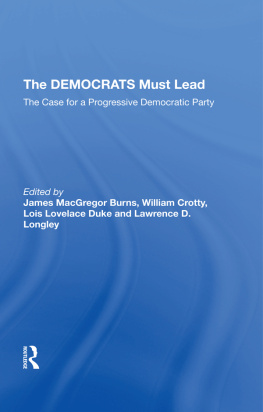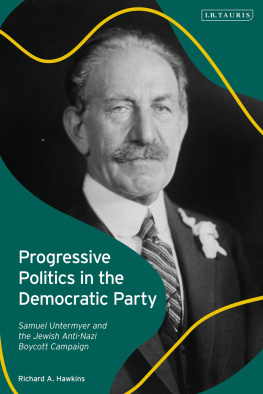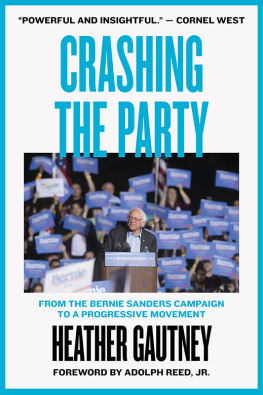VICTORY
AMERICAN POLITICAL INSTITUTIONS AND PUBLIC POLICY
Stephen J. Wayne
Series Editor
VICTORY
How a Progressive Democratic Party Can Win and Govern
Arthur Sanders
THE POLITICS OF JUSTICE
The Attorney General and the Making of Legal Policy
Cornell W. Clayton
AMERICAN POLITICAL INSTITUTIONS AND PUBLIC POLICY
Victory
How a Progressive Democratic Party Can Win and Govern
Arthur Sanders
First published 1992 by M.E. Sharpe
Published 2015 by Routledge
2 Park Square, Milton Park, Abingdon, Oxon OX14 4RN
711 Third Avenue, New York, NY 10017, USA
Routledge is an imprint of the Taylor & Francis Group, an informa business
Copyright 1992 Taylor & Francis. All rights reserved.
No part of this book may be reprinted or reproduced or utilised in any form or by any electronic, mechanical, or other means, now known or hereafter invented, including photocopying and recording, or in any information storage or retrieval system, without permission in writing from the publishers.
Notices
No responsibility is assumed by the publisher for any injury and/or damage to persons or property as a matter of products liability, negligence or otherwise, or from any use of operation of any methods, products, instructions or ideas contained in the material herein.
Practitioners and researchers must always rely on their own experience and knowledge in evaluating and using any information, methods, compounds, or experiments described herein. In using such information or methods they should be mindful of their own safety and the safety of others, including parties for whom they have a professional responsibility.
Product or corporate names may be trademarks or registered trademarks, and are used only for identification and explanation without intent to infringe.
Library of Congress Cataloging-in-Publication Data
Sanders, Arthur B.
Victory: how a progressive Democratic Party can win and govern/by Arthur Sanders.
p. cm
(American political institutions and public policy)
Includes bibliographical references and index.
ISBN 1-56324-087-4 (cloth)
ISBN 1-56324-088-2 (pbk.)
1. Democratic Party (U.S.)Platforms. 2. United StatesPolitics and government1989
I. Title.
II. Series.
JK2316.S25 1992
324.2736dc20
92-13465
CIP
ISBN 13: 9781563240881 (pbk)
ISBN 13: 9781563240874 (hbk)
For Deborah,
and for Ben.
Arthur Sanders, a professor of political science at Drake University, is a bridge builder. In this book he connects two divergent and often belligerent camps; that of the academician and that of the practitioner. Sanders is concerned with both democratic theory and the Democratic Party. He is interested in representation and responsiveness on the one hand, and the Democrats' winning national elections and governing effectively on the other. What he does in Victory is argue that both of these objectives can be achieved, that the Democratic Party should be more sensitive to its core constituency and that by so doing it can both win and govern.
The case Sanders makes for a progressive Democratic Party confounds conventional wisdom. It rejects the interpretation of most political pundits that Democratic candidates need to move to the center if they are to win presidential elections, an interpretation that the party's recent nominees seem to have accepted.
To make his case, Sanders dons his professorial cap as a political scientist. He presents and analyzes data on public opinion and voting behavior to support his claim that there is a sufficiently large population and voter base that would be energized by a progressive appeal. And this energy not only would increase the Democratic vote; it would rejuvenate the entire political system. Given the low voter turnout and the high levels of cynicism and apathy that plague the contemporary electorate, that would be no small accomplishment.
Obviously identifying a potential vote is not the same thing as obtaining it. Sanders addresses the "how to do it" issue as well by discussing the type of appeal the Demcorats should make and the general category of issues they should stress. He believes that the Democrats can rebuild their majority coalition, can win in the Electoral College, and can provide responsible party government. Thus, what he presents is an argument for action and a blueprint for victory. His is a compelling case, written with flare and without social science jargon but predicated on social science data, a case which party leaders will have to consider seriously in the 1990s. Let the debate over the composition and disposition of the Democratic Party begin once again!
Stephen J. Wayne
Georgetown University
One of the pleasures of writing a book about the future of the Democratic Party and American politics is that you are always "doing research." Dinner conversations, classroom discussions, lunchtime chats all serve as forums to try out ideas and engage in dialogue about the topics contained in these pages. I, thus, owe an enormous debt of gratitude to the many friends, colleagues, and students who have discussed and argued with me about the future of American politics and the Democratic Party over the years. In particular, my thinking about these matters has profited greatly from my conversations with Jim White of the Congressional Budget Office, Yin Auger of the Hamilton College Department of Government, Ken Wagner, director of The Swedish Program, Deborah Gerner and Phil Schrodt of Kansas University, and two of my colleagues here at Drake University, David Skidmore and Dennis Goldford. Their friendly encouragement, spirited debate, and general insights have helped to guide my thinking about these matters. Dennis, in addition, took the time to read a draft of the manuscript and his comments were quite helpful.
Some of the ideas contained in this book were also presented at a panel run by the "Political Scientists for a Progressive Democratic Party" at the 1991 Meeting of the Midwest Political Science Association. The comments and suggestions made by the other panelists, James MacGregor Burns of Williams College, Andrew Dobelstein of the University of North Carolina, Gary Orfield of Chicago University, Monica Bauer of Western New England College, and especially the two discussants, Lois Lovelace Duke of Clemson University and Sue Thomas of Georgetown University, were quite useful, as were the detailed comments sent to me after that panel by Vernon Van Dyke of the University of Iowa. In addition, two anonymous reviewers of the manuscript provided valuable and useful criticism and commentary.
I also want to pay a special thanks to the students in my classes on American politics, particularly those in my classes on "The American Electoral Process" and "Political Parties and Interest Groups." Over the years they have listened to, challenged, and discussed many of the ideas contained in this book. It would be impossible to list all of the fine students I have had in these classes, but I want to make special note of one, Mark Elias. Mark was the kind of student who makes teaching a pleasure. He was always thinking, questioning, and challenging. If class ended and he was still not satisfied, he would come by to pick up the argument later. I know when we discussed the future of the Democratic Party he did not think he was helping me write a book, but he was.

